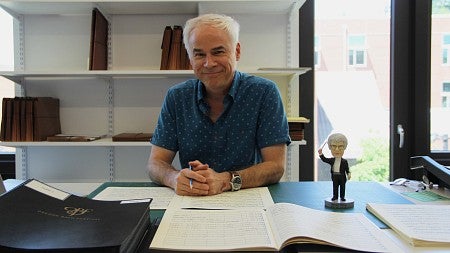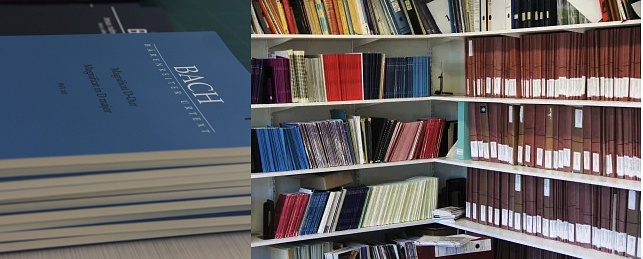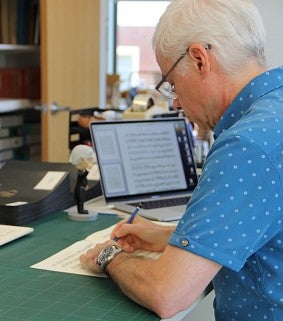
OBF music librarian, Greg Hamilton
The average concertgoer has likely never heard of an orchestra librarian or what such a position entails. However, the role is not just important, but crucial to the success of the Oregon Bach Festival (OBF). That is because librarians provide the music audiences will hear – literally.
Since 2013, Greg Hamilton has been OBF’s orchestra librarian. On Wednesday, he hauled sheet music for dozens of works to be performed throughout the festival from his home in Canada to Berwick Hall on the University of Oregon campus.

Sheet music in Berwick’s music library
Greg has numerous other duties and responsibilities in addition to physically providing sheet music. First and foremost, in his role as music librarian, he must be an expert in music publishers, copyright law, and have an intimate knowledge of the orchestral repertoire. Last minute changes from a conductor are not uncommon, making problem-solving essential.
Greg is also responsible for the research and acquisition of the music, and this process begins as soon as six months prior to the Oregon Bach Festival. For many works, multiple editions may be available. It is important for the librarian to communicate with the conductors to help identify the differences between each edition, if needed. “I dip my toe into the world of musicology,” Greg said. “I must also have familiarity with Italian, French, and German musical terms found in scores. It is important to have this knowledge.”
Once the various editions are chosen, he will acquire and catalog the music, and then begin the process of music preparation, which involves adding performance aides and markings to the musicians’ parts (sheet music). “Music notation is a complex written language with a vast array of symbols to interpret,” Greg explained. For example, markings which indicate bow direction must be added to the string parts, which the string principals will determine. The librarian will then copy these markings to the additional parts—a process which must be done by hand via pencil in case any changes occur during the rehearsal process.

Music preparation also involves correcting any mistakes found in the printed music. “Correcting errata is essential as it can save valuable rehearsal time and can also be disruptive to the rehearsal process,” Greg said. "What I find gratifying is when musicians get the music, and they don't need to worry about anything. They can just play and work towards artistic excellence.”
Greg will also be on hand throughout the festival if questions or issues arise during rehearsals. When showtime comes, he will place folders containing sheet music on each music stand and place the conductor’s score just before the concert begins—this is one of the few times the audience will see the librarian!
Greg has worked as an orchestra librarian for 15 years. He has been working as the principal librarian for the Victoria Symphony in Canada, and prior to that, the Winnipeg Symphony Orchestra. A British Columbia native, he is a former bass player specializing in jazz. Having graduated from Western Washington University in Bellingham in 1988, he spent his spare time playing gigs and learning the craft of a music copyist.
Prior to the availability of music notation software, a music copyist would extract or “copy out” each instrumental part by hand with a calligraphy pen. "It was brutal!” Greg exclaimed. “It was! After many hours of copying out parts, you would get the “claw,” where your hand is stuck in the position you were writing in.”
Nowadays, Greg is an expert in using a music software program called Finale which digitizes the process. The software is essential when he is asked to acquire obscure pieces where only an old manuscript score is available, or the individual parts may have been lost or illegible. In this case, Greg must decipher the score and create a new set of parts via Finale.
If the parts do exist, they may be outdated. “There are notational conventions that have changed a bit from the 17th and 18th centuries,” Greg laughed. “It would be a little unreasonable to ask the musicians to read from those old parts. That is something I enjoy editing and preparing.”
He underwent this process for three Oregon Bach Festival works this year: Joseph Bologne’s Symphony No. 2, Telemann’s “Hamburg Admiralty Music”, and “Ruhe sanft, mein holdes Leben,” the Mozart aria. “I find it extremely gratifying to create some beauty in this kind of work,” Greg said. “I take great pride in my work with the festival, and collaborating with all my colleagues. It really does take a collective effort to bring each concert to the stage.”
Tickets for the Oregon Bach Festival may be purchased here.
